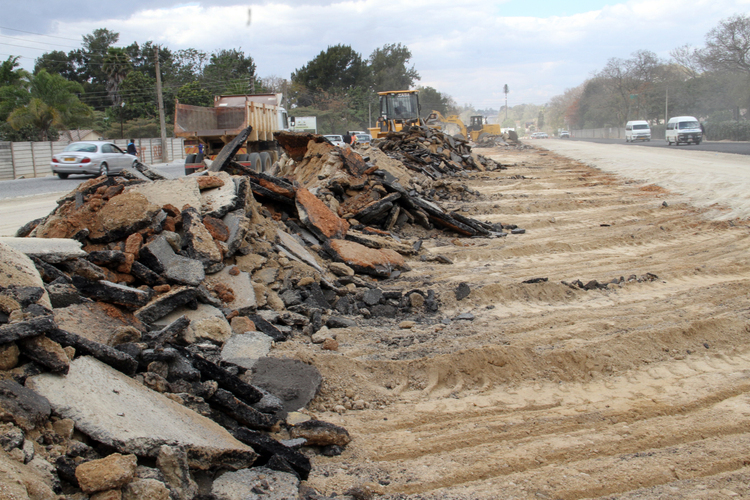
The Sunday Mail

MORE than US$800 million could accrue to local companies as Government intensifies efforts to rehabilitate and dualise the Chirundu-Harare-Beitbridge highway – a project considered to be arguably the biggest infrastructure investment the country has seen so far.
Experts say that the works on the 897-kilometre stretch from Chirundu to Beitbridge could gobble between US$1,8 billion and US$2 billion.
** Four local firms to be shortlisted for designs
** Project considered biggest ever infrastructure development
** Border Posts to be modernised
What has added optimism in industry is the potential positive spin-offs that could be generated from the project whose value is considered to be more than seven times the size of the Plumtree-Harare-Mutare highway, which cost US$280 million.
The recent withdrawal of a court case by Zimhighways, a consortium of local construction companies that were contesting Government for the concession of the road, has added oomph to the whole project.
Already, Government through General Notice 236 of 2015, has requested for technical and financial proposals for the preliminary and detailed engineering for the dualisation of the highway, which is a gateway to Africa’s second biggest economy, South Africa.
Last week, senior Government officials who spoke on condition of anonymity due to the sensitivity of the behind-the-scenes negotiations, said Government is moving to cut back on the time that it will take to implement the project and was therefore investing a lot of effort to ensure that all the works will be implemented simultaneously.
It is understood that while Government will choose the main contractor for the works, about 50 percent of the project will be undertaken by local companies that will be sub-contracted.
The Sunday Mail Business is reliably informed that four Zimbabwean companies will be shortlisted for the designs and major announcements on the project will be made in the next three to four weeks.
“They are a number of proposals that have been received from companies that are willing to fund and implement the project and major announcements will be made in the next three to four weeks. In anticipation of the resolution of the dispute (with Zimhighways), Government was already making preparations and finalising the implementation of the project.
“The design will assist in coming up with the closest estimate in terms of the resources that will be needed for the project. But one of the key considerations that Government will be making is to ensure that local companies play a key role. In fact, it has always been Government’s position so about 50 percent of the works will be done by locals,” said a senior Government official.
Consulting engineering firms will be roped in for preliminary and detailed engineering design of the Harare-Masvingo-Beitbridge road dualisation, which has since been segmented into four sections; Harare-Chivhu (120km), Chivhu-Masvingo (147km), Masvingo-Rutenga (149km) and Rutenga-Beitbridge (135km).
Detailed engineering designs, drawings, cost estimates for the dualisation – including bridges and drainage structures – are expected to be developed by the shortlisted firms.
Investigations carried out by this publication revealed that they are a lot of expressions of interest for the project and there are indications that the funding will come from the Far East.
The Department of Roads, which falls under the Ministry of Transport and Infrastructure Development, will supervise the project in order to ensure quality control.
In the Infralink Plumtree-Harare-Mutare project which was a joint venture partnership between the Zimbabwe National Roads Administration (Zinara) and Group Five of South Africa, local companies that were scouted to provide project management, the supply of quarry, cement, steel, and electrical engineering, including the hiring out of key road equipment, benefited immensely.
Along the Harare-Mutare stretch, local companies such as Utare, a consortium between Bitcon and Tarcon, Madz and Skindat were subcontracted to work on some 80 kilometre stretches.
Other local companies on the project also included MacDonald Bricks and PPC in Bulawayo. Traffic Solutions are doing the road markings while PG Bulawayo supplied materials that are being used at the toll plazas.
Meanwhile, information gathered by The Sunday Mail Business indicates that in addition to the actual road works, there is a parallel initiative to modernise and upgrade all the country’s ports of entry.
It is envisaged that the completion of all these projects will naturally improve both the appeal and profile of the highway as a major thoroughfare in the region.
Sources said the National Ports Authority Bill will be debated during the Third Session of the Eighth Parliament of Zimbabwe that will be officially opened by President Robert Mugabe on September 15, 2015.
The project is expected to generate lucractive business for locals.
“The Chirundu-Harare- Beitbridge project should be considered as an anchor project that will help lift the local economy. But it has to be considered that we will also be simultaneously modernising and upgrading our ports of entry such as Chirundu, Nyamapanda and Kazungula. After the road has been spruced up and the ports modernised, they will definitely be an increased of traffic, which will make the project not technically feasible, but financially feasible as well,” added the source.
Due to the centrality of Zimbabwe in the Southern Africa Development Community (Sadc) region, experts opine that the country could be modelled as a major logistical hub.
In April 2012, Africa Development Bank (AfDB) vice president and economist, Professor Mthuli Ncube noted that delays at Beitbridge border post cost about US$35 million annually.
“The delays, high congestion and inefficient service delivery experienced on the Beitbridge border are very costly in terms of waiting time and transaction costs ranging from US$29,3 million and US$35 million. The costs are limiting the prospects for intra-regional trade expansion,” he said.
There were real fears that due to the inconvenience at the border posts and the current state of the highways, traffic will be forced to circumvent the road link and opt for other regional routes.
Major infrastructural investments fall under the ambit of Government’s 10-point plan for economic recovery that was recently enunciated by President Mugabe.



